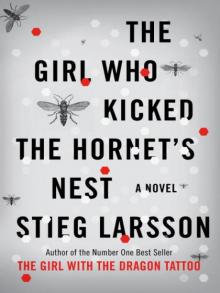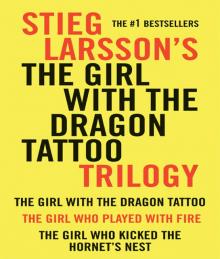- Home
- Stieg Larsson
The Girl Who Kicked The Hornets’ Nest m(-3 Page 16
The Girl Who Kicked The Hornets’ Nest m(-3 Read online
Page 16
“What do you need now?”
“A little more legwork.”
“Micke, I hate to say this, but I have a job to do. I’m editorial assistant now.”
“An excellent career advancement.”
“What is it you want?”
“Over the years there have been a number of public reports on Säpo. Carl Lidbom did one. There must be several others like it.”
“I see.”
“Order everything you can find from parliament: budgets, public reports, interpellations, and the like. And get Säpo’s annual reports as far back as you can find them.”
“Yes, master.”
“Good man. And, Henry…”
“Yes?”
“I don’t need them until tomorrow.”
Salander spent the whole day brooding about Zalachenko. She knew that he was only two doors away, that he wandered in the corridors at night, and that he had come to her room at 3.10 this morning.
She had tracked him to Gosseberga fully intending to kill him. She had failed, with the result that Zalachenko was alive and tucked up in bed barely ten metres from where she was. And she was in hot water. She could not tell how bad the situation was, but she supposed that she would have to escape and discreetly disappear abroad herself if she did not want to risk being locked up in some nuthouse again with Teleborian as her warder.
The problem was that she could scarcely sit upright in bed. She did notice improvements. The headache was still there, but it came in waves instead of being constant. The pain in her left shoulder had subsided a bit, but it resurfaced whenever she tried to move.
She heard footsteps outside the door and saw a nurse open it to admit a woman wearing black trousers, a white blouse, and a dark jacket. She was a pretty, slender woman with dark hair and a boyish hairstyle. She radiated a cheerful confidence. She was carrying a black briefcase. Salander saw at once that she had the same eyes as Blomkvist.
“Hello, Lisbeth. I’m Annika Giannini,” she said. “May I come in?”
Salander studied her without expression. All of a sudden she did not have the slightest desire to meet Blomkvist’s sister and regretted that she had accepted this woman as her lawyer.
Giannini came in, shut the door behind her, and pulled up a chair. She sat there for some time, looking at her client.
The girl looked terrible. Her head was wrapped in bandages. She had purple bruises around her bloodshot eyes.
“Before we begin to discuss anything, I have to know whether you really do want me to be your lawyer. Normally I’m involved in civil cases in which I represent victims of rape or domestic violence. I’m not a criminal defence lawyer. I have, however, studied the details of your case, and I would very much like to represent you, if I may. I should also tell you that Mikael Blomkvist is my brother – I think you already know that – and that he and Dragan Armansky are paying my fee.”
She paused, but when she got no response she continued.
“If you want me to be your lawyer, it’s you I will be working for. Not for my brother or for Armansky. I have to tell you too that I will receive advice and support during any trial from your former guardian, Holger Palmgren. He’s a tough old boy, and he dragged himself out of his sickbed to help you.”
“Palmgren?”
“Yes.”
“Have you seen him?”
“Yes.”
“How’s he doing?”
“He’s absolutely furious, but strangely he doesn’t seem to be at all worried about you.”
Salander smiled lopsidedly. It was the first time she had smiled at Sahlgrenska hospital.
“How are you feeling?”
“Like a sack of shit.”
“Well then. Do you want me to be your lawyer? Armansky and Mikael are paying my fee and –”
“No.”
“What do you mean, no?”
“I’ll pay your fee myself. I don’t want a single öre from Armansky or Kalle Blomkvist. But I can’t pay before I have access to the Internet.”
“I understand. We’ll deal with that problem when it arises. In any case, the state will be paying most of my salary. But do you want me to represent you?”
Salander gave a curt nod.
“Good. Then I’ll get started by giving you a message from Mikael. It sounds a little cryptic, but he says you’ll know what he means.”
“Oh?”
“He wants you to know that he’s told me most of the story, except for a few details, of which the first concerns the skills he discovered in Hedestad.”
He knows that I have a photographic memory… and that I’m a hacker. He’s kept quiet about that.
“O.K.”
“The other is the D.V.D. I don’t know what he’s referring to, but he was adamant that it’s up to you to decide whether you tell me about it or not. Do you know what he’s referring to?”
The film of Bjurman raping me.
“Yes.”
“That’s good, then.” Giannini was suddenly hesitant. “I’m a little miffed at my brother. Even though he hired me, he’ll only tell me what he feels like telling me. Do you intend to hide things from me too?”
“I don’t know. Could we leave that question for later?” Salander said.
“Certainly. We’re going to be talking to each other quite a lot. I don’t have time for a long conversation now – I have to meet Prosecutor Jervas in forty-five minutes. I just wanted to confirm that you really do want me to be your lawyer. But there’s something else I need to tell you.”
“Yes?”
“It’s this: if I’m not present, you’re not to say a single word to the police, no matter what they ask you. Even if they provoke you or accuse you of whatever… Can you promise me?”
“I could manage that.”
Gullberg had been completely exhausted after all his efforts on Monday. He did not wake until 9.00 on Tuesday morning, four hours later than usual. He went to the bathroom to shower and brush his teeth. He stood for a long time looking at his face in the mirror before he turned off the light and went to get dressed. He chose the only clean shirt he had left in the brown briefcase and put on a brown-patterned tie.
He went down to the hotel’s breakfast room, drank a cup of black coffee and ate a slice of wholemeal toast with cheese and a little marmalade on it. He drank a glass of mineral water.
Then he went to the hotel lobby and called Clinton’s mobile from the public telephone.
“It’s me. Status report?”
“Rather unsettled.”
“Fredrik, can you handle this?”
“Yes, it’s like the old days. But it’s a shame von Rottinger isn’t still with us. He was better at planning operations than I.”
“You were equally good. You could have switched places at any time. Which indeed you quite often did.”
“It’s a matter of intuition. He was always a little sharper.”
“Tell me, how are you all doing?”
“Sandberg is brighter than we thought. We brought in the external help in the form of Mårtensson. He’s a gofer, but he’s usable. We have taps on Blomkvist’s landline and mobile. We’ll take care of Giannini’s and the Millennium office telephones today. We’re looking at the blueprints for all the relevant offices and apartments. We’ll be going in as soon as it can be done.”
“First thing is to locate all the copies…”
“I’ve already done that. We’ve had some unbelievable luck. Giannini called Blomkvist this morning. She actually asked him how many copies there were in circulation, and it turned out that Blomkvist only has one. Berger copied the report, but she sent the copy on to Bublanski.”
“Good. No time to waste.”
“I know. But it has to be done in one fell swoop. If we don’t lift all the copies simultaneously, it won’t work.”
“True.”
“It’s a bit complicated, since Giannini left for Göteborg this morning. I’ve sent a team of externals to tail her. They’re flying
down right now.”
“Good.” Gullberg could not think of anything more to say. “Thanks, Fredrik,” he said at last.
“My pleasure. This is a lot more fun than sitting around waiting for a kidney.”
They said goodbye. Gullberg paid his hotel bill and went out to the street. The ball was in motion. Now it was just a matter of mapping out the moves.
He started by walking to Park Avenue Hotel, where he asked to use the fax machine. He did not want to do it at the hotel where he had been staying. He faxed copies of the letters he had written the day before. Then he went out on to Avenyn to look for a taxi. He stopped at a rubbish bin and tore up the photocopies of his letters.
Giannini was with Prosecutor Jervas for fifteen minutes. She wanted to know what charges she was intending to bring against Salander, but she soon realized that Jervas was not yet sure of her plan.
“Right now I’ll settle for charges of grievous bodily harm or attempted murder. I refer to the fact that Salander hit her father with an axe. I take it that you will plead self-defence?”
“Maybe.”
“To be honest with you, Niedermann is my priority at the moment.”
“I understand.”
“I’ve been in touch with the Prosecutor General. Discussions are ongoing as to whether to combine all the charges against your client under the jurisdiction of a prosecutor in Stockholm and tie them in with what happened here.”
“I assumed that the case would be handled in Stockholm,” Giannini said.
“Fine. But I need an opportunity to question the girl. When can we do that?”
“I have a report from her doctor, Anders Jonasson. He says that Salander won’t be in a condition to participate in an interview for several days yet. Quite apart from her injuries, she’s on powerful painkillers.”
“I received a similar report, and as you no doubt realize, this is frustrating. I repeat that my priority is Niedermann. Your client says that she doesn’t know where he’s hiding.”
“She doesn’t know Niedermann at all. She happened to identify him and track him down to Gosseberga, to Zalachenko’s farm.”
“We’ll meet again as soon as your client is strong enough to be interviewed,” Jervas said.
Gullberg had a bunch of flowers in his hand when he got into the lift at Sahlgrenska hospital at the same time as a short-haired woman in a dark jacket. He held the lift door open for her and let her go first to the reception desk on the ward.
“My name is Annika Giannini. I’m a lawyer and I’d like to see my client again, Lisbeth Salander.”
Gullberg turned his head very slowly and looked in surprise at the woman he had followed out of the lift. He glanced down at her briefcase as the nurse checked Giannini’s I.D. and consulted a list.
“Room twelve,” the nurse said.
“Thank you. I know the way.” She walked off down the corridor.
“May I help you?”
“Thank you, yes. I’d like to leave these flowers for Karl Axel Bodin.”
“He’s not allowed visitors.”
“I know. I just want to leave the flowers.”
“We’ll take care of them.”
Gullberg had brought the flowers with him mainly as an excuse. He wanted to get an idea of how the ward was laid out. He thanked the nurse and followed the sign to the staircase. On the way he passed Zalachenko’s door, room fourteen according to Jonas Sandberg.
He waited in the stairwell. Through a glass pane in the door he saw the nurse take the bouquet into Zalachenko’s room. When she returned to her station, Gullberg pushed open the door to room fourteen and stepped quickly inside.
“Good morning, Alexander,” he said.
Zalachenko looked up in surprise at his unannounced visitor. “I thought you’d be dead by now,” he said.
“Not quite yet.”
“What do you want?”
“What do you think?”
Gullberg pulled up the chair and sat down.
“Probably to see me dead.”
“Well, that’s gratitude for you. How could you be so bloody stupid? We give you a whole new life and you finish up here.”
If Zalachenko could have laughed he would have. In his opinion, the Swedish Security Police were amateurs. That applied to Gullberg and equally to Björck. Not to mention that complete idiot Bjurman.
“Once again we have to haul you out of the furnace.”
The expression did not sit well with Zalachenko, once the victim of a petrol bomb attack – from that bloody daughter of his two doors down the corridor.
“Spare me the lectures. Just get me out of this mess.”
“That’s what I wanted to discuss with you.”
Gullberg put his briefcase on to his lap, took out a notebook, and turned to a blank page. Then he gave Zalachenko a long, searching look.
“There’s one thing I’m curious about… were you really going to betray us after all we’ve done for you?”
“What do you think?”
“It depends how crazy you are.”
“Don’t call me crazy. I’m a survivor. I do what I have to do to survive.”
Gullberg shook his head. “No, Alexander, you do what you do because you’re evil and rotten. You wanted a message from the Section. I’m here to deliver it. We’re not going to lift a finger to help you this time.”
All of a sudden Zalachenko looked uncertain. He studied Gullberg, trying to figure out if this was some puzzling bluff.
“You don’t have a choice,” he said.
“There’s always a choice,” Gullberg said.
“I’m going to –”
“You’re not going to do anything at all.”
Gullberg took a deep breath, unzipped the outside pocket of his case, and pulled out a 9 mm Smith&Wesson with a gold-plated butt. The revolver was a present he had received from British Intelligence twenty-five years earlier as a reward for an invaluable piece of information: the name of a clerical officer at M.I.5 who in good Philby style was working for the Russians.
Zalachenko looked astonished. Then he burst out laughing.
“And what are you going to do with that? Shoot me? You’ll spend the rest of your miserable life in prison.”
“I don’t think so.”
Zalachenko was suddenly very unsure whether Gullberg was bluffing.
“There’s going to be a scandal of enormous proportions.”
“Again, I don’t think so. There’ll be a few headlines, but in a week nobody will even remember the name Zalachenko.”
Zalachenko’s eyes narrowed.
“You’re a filthy swine,” Gullberg said then with such coldness in his voice that Zalachenko froze.
Gullberg squeezed the trigger and put the bullet right in the centre of Zalachenko’s forehead just as the patient was starting to swing his prosthesis over the edge of the bed. Zalachenko was thrown back on to the pillow. His good leg kicked four, five times before he was still. Gullberg saw a red flower-shaped splatter on the wall behind the bedhead. He became aware that his ears were ringing after the shot and he rubbed his left one with his free hand.
Then he stood up and put the muzzle to Zalachenko’s temple and squeezed the trigger twice. He wanted to be sure this time that the bastard really was dead.
Salander sat up with a start the instant she heard the first shot. Pain stabbed through her shoulder. When the next two shots came she tried to get her legs over the edge of the bed.
Giannini had only been there for a few minutes. She sat paralysed and tried to work out from which direction the sharp reports had come. She could tell from Salander’s reaction that something deadly was in the offing.
“Lie still,” she shouted. She put her hand on Salander’s chest and shoved her client down on to the bed.
Then Giannini crossed the room and pulled open the door. She saw two nurses running towards another room two doors away. The first nurse stopped short on the threshold. “No, don’t!” she screamed and then took a
step back, colliding with the second nurse.
“He’s got a gun. Run!”
Giannini watched as the two nurses took cover in the room next to Salander’s.
The next moment she saw a thin, grey-haired man in a hound’s-tooth jacket walk into the corridor. He had a gun in his hand. Annika recognized him as the man who come up in the lift with her.
Then their eyes met. He appeared confused. He aimed the revolver at her and took a step forward. She pulled her head back in and slammed the door shut, looking around in desperation. A nurses’ table stood right next to her. She rolled it quickly over to the door and wedged the tabletop under the door handle.
She heard a movement and turned to see Salander just starting to clamber out of bed again. In a few quick steps she crossed the floor, wrapped her arms around her client and lifted her up. She tore electrodes and I.V. tubes loose as she carried her to the bathroom and set her on the toilet seat. Then she turned and locked the bathroom door. She dug her mobile out of her jacket pocket and dialled 112.
Gullberg went to Salander’s room and tried the door handle. It was blocked. He could not move it even a millimetre.
For a moment he stood indecisively outside the door. He knew that the lawyer Giannini was in the room, and he wondered if a copy of Björck’s report might be in her briefcase. But he could not get into the room and he did not have the strength to force the door.
That had not been part of the plan anyway. Clinton would take care of Giannini. Gullberg’s only job was Zalachenko.
He looked around the corridor and saw that he was being watched by nurses, patients and visitors. He raised the pistol and fired at a picture hanging on the wall at the end of the corridor. His spectators vanished as if by magic.
He glanced one last time at the door to Salander’s room. Then he walked decisively back to Zalachenko’s room and closed the door. He sat in the visitor’s chair and looked at the Russian defector who had been such an intimate part of his own life for so many years.
He sat still for almost ten minutes before he heard movement in the corridor and was aware that the police had arrived. By now he was not thinking of anything in particular.
Then he raised the revolver one last time, held it to his temple, and squeezed the trigger.

 The Girl with the Dragon Tattoo
The Girl with the Dragon Tattoo The Girl Who Kicked the Hornet's Nest
The Girl Who Kicked the Hornet's Nest The Girl Who Played with Fire
The Girl Who Played with Fire The Girl with the Dragon Tattoo m(-1
The Girl with the Dragon Tattoo m(-1 The Girl who played with Fire m(-2
The Girl who played with Fire m(-2 Millennium 01 - The Girl with the Dragon Tattoo
Millennium 01 - The Girl with the Dragon Tattoo The Girl Who Kicked The Hornets’ Nest m(-3
The Girl Who Kicked The Hornets’ Nest m(-3 Millennium 02 - The Girl Who Played with Fire
Millennium 02 - The Girl Who Played with Fire Millennium 03 - The Girl Who Kicked the Hornet's Nest
Millennium 03 - The Girl Who Kicked the Hornet's Nest The Girl With the Dragon Tattoo Trilogy Bundle
The Girl With the Dragon Tattoo Trilogy Bundle![Millenium [02] The Girl Who Played With Fire Read online](http://i1.bookreadfree.com/i2/04/12/millenium_02_the_girl_who_played_with_fire_preview.jpg) Millenium [02] The Girl Who Played With Fire
Millenium [02] The Girl Who Played With Fire